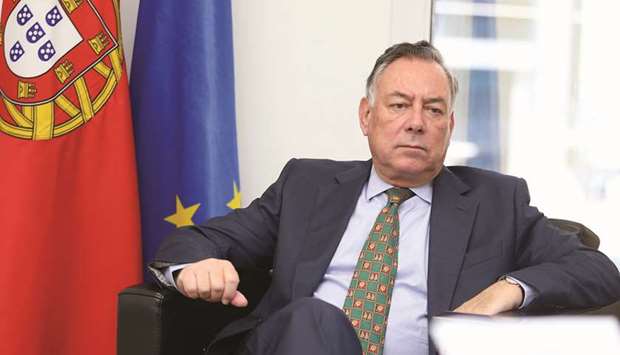By Mudassir Raja
Ambassador of Portugal to Qatar Antonio Tanger Correa is retiring next year. He is a seasoned diplomat and an experienced negotiator with significant achievements for Portugal to his credit in a distinguished career.
Easy going and sociable, ambassador Correa freewheeled on different subjects ranging from diplomacy to leisure in an interview with Community at his office. Excerpts from the interview:
Please let us know about your family, education, career, and travels.
I have three children…two boys and a girl. I cannot call them children — they are all grown up now (laughs). I was born in 1952 in a traditional Portuguese family. I went to a boarding school for five years, did faculty of law, and then, worked for a while in Brazil before pressing into diplomatic service in 1978.
I have been an Olympic athlete, too, participating in the Olympic Games doing sailing. I have served for Portugal in China, Canada, India, Bosnia, Yugoslavia, Brazil, Egypt, and as EU envoy for the Balkans. I will retire next year.
How do you best describe diplomacy? What are its basic tenets?
I think it is about bringing people together and making things happen. Basically, that means you have to use different methods so that the end result can be a positive one for every body — because a good deal is good for everybody and not only for one party. A deal good for one party and not good for another is not a good deal and, will in future, create more problems than solutions.
What has been your most challenging career assignment?
There have been many. But I think I had two or say, three most challenging assignments; primarily, being an ambassador in Bosnia making peace between the parties. In the second instance, it was being an ambassador in Yugoslavia in 1999; and thirdly, when I was a Special Envoy for the Balkans for the EU during the course of the crisis.
What are the other highlights of your career?
Well, for starters, I negotiated the first agreement between all Portuguese speaking countries after their independence. It was back in 1980 in Copenhagen, Denmark. Among other achievements, I guess it was getting most of the Balkan countries to sign agreements with the EU during my term as special envoy. As for Portugal, where I served, I tried to pitch ways for the Portuguese language and culture. I opened a consulate in Goa, India and the embassy in Bosnia and Lithuania.
How many Portuguese live in Qatar and what professions are they associated with?
There are about 1,500 Portuguese in Qatar according to our data. They are in multiple professions, including pilots and other professionals in Qatar Airways, engineers, football coaches and architects. We also have people in the electronic media.
What is your take on Portugal-Qatar relations?
The relationship was almost non-existent when I came here. We got in touch with the Qatari embassy in Lisbon and got to work. Now, I can say after two years of hard work, Portugal is much better known in Qatar and Qatar is much better known in Portugal. We have had the Portuguese prime minister visit Qatar and His Highness the Emir Sheikh Tamim bin Hamad al-Thani was to visit Portugal, but it was cancelled following the Gulf crisis.
Where does the current bilateral trade stand?
The trade is still miniscule. I do not think that the main economic plank between Portugal and Qatar is trade because Qatar only exports oil and gas and we import them from other places. We also do not export the goods that are of prime importance here. Where I think we can improve in is to bring technology to Qatar. There are several technologies; for instance, airport systems. There are many companies trying now to come to Qatar in the services sector.
There are a lot of opportunities for investment in Portugal. We are a safe country — may be the safest in Europe. A Qatari business company is already building a hotel in Portugal. Qatar has big investment in our energy sector. I hope the Qatari investment will increase with time.
What do you do in your leisure?
When free, I always go to exhibitions. Then, I have a karate class — they organise two or three sessions a week. It is necessary to keep my mind and body in good shape. I am not a movie addict. I will read books depending on phases. Sometimes, I read novels and, at other times, I read about politics. I love music from the 70s and 80s. I also very much love French music.”
Tell us about your experience living in Doha.
I go out depending on the weather. Now is the time for outdoor places of which there are plenty in Doha. You go out with a friend to enjoy coffee.
What advice you will give a budding diplomat?
First, not to have any expectation, to moderate your ambitions and chiefly, to learn how to separate important things from urgent things.
What is that one lesson that has always held you in good stead? What are you looking at post-retirement?
My biggest lesson in life has been sailing. The sea is extremely strong and I come from this Atlantic environment. I started sailing since I was a seven-year-old. You cannot dominate the sea. You have to learn how to respect the sea. Enjoy the sea whilst respecting it. This is the lesson I have carried in life. After my retirement, I will do counselling, using my experience and contacts.
Community / Culture
“I think (diplomacy) is about bringing people together and making things happen”

SURGE: u201cThere are many companies trying now to come to Qatar in the services sector,u201d says ambassador Antonio Tanger Correa. Photo by Jayan Orma
